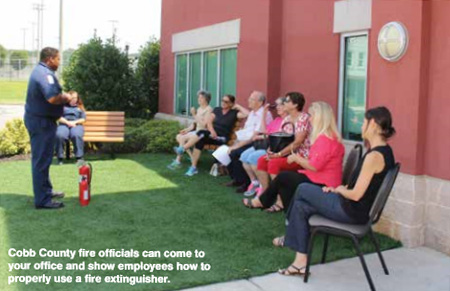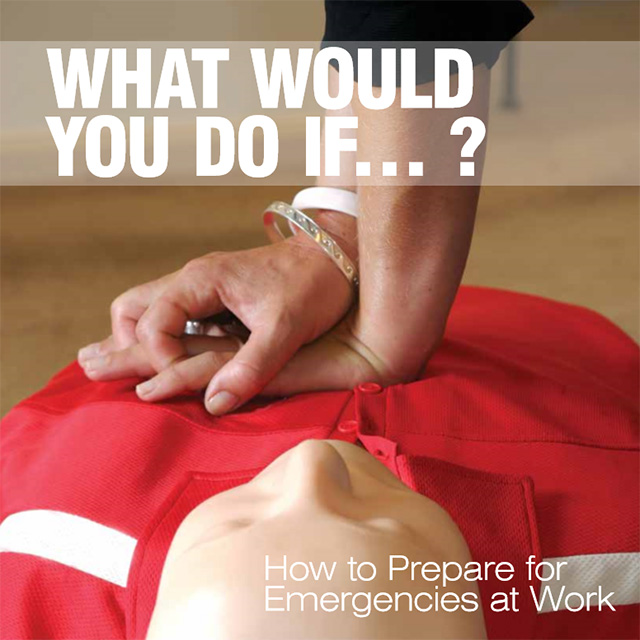Most people don’t want to think about it, but experts say it’s better to have a plan and practice it than to face a crisis and not have any idea what to do.
Active shooter in your building. Smoke coming in under your office door. Tornado sirens blaring outside. You’re at the office; would you know what to do? Because you’re working in Cobb County, your resources for emergency preparedness are plentiful, and best of all many are offered at no cost to businesses, schools and residents.
“All our agencies in the county work together to ensure that our businesses and citizens are prepared for all kinds of emergencies,” says Sgt. Dana Pierce with Cobb County Police. “When there’s an emergency of any kind, time is critical. The call goes out and we’re there in minutes.”
Over the summer, county agencies implemented annual active shooter training. “We trained more than 650 Cobb County police [officers] and took our training to the schools for the schools and their resource officers,” Pierce says. “Now we’re opening up our training to businesses and individuals in the five precincts to reach a larger audience.”
A number of agencies in Cobb work together to ensure that businesses and residents are prepared and safe in all kinds of crisis situations by offering emergency preparedness programs. Representatives from Cobb Police, Cobb Fire, Cobb-Douglas Center for Emergency Preparedness and Response (part of the Georgia Department of Public Health) and other groups conduct sessions at no charge at public facilities and in workplaces.
 Cobb County’s Fire Life Safety Educator Dennis Rucker has spent the past 15 years educating businesses about emergency preparedness and best practices. “Our programs cover four main areas: fire evacuation, emergency medical situations, violent weather and active shooter,” says the 25-year veteran of the Cobb County Fire Department. Topics within these areas include identifying at least two evacuation routes in case of fire, properly using a fire extinguisher and basic safety protocols for severe weather. “You’d be surprised what many people do when they hear a weather siren — they head right to the nearest window to look outside to see what’s going on,” he says. “That’s the worst thing you can do. You should immediately seek cover in an internal space on a lower floor or in a stairwell, away from windows.”
Cobb County’s Fire Life Safety Educator Dennis Rucker has spent the past 15 years educating businesses about emergency preparedness and best practices. “Our programs cover four main areas: fire evacuation, emergency medical situations, violent weather and active shooter,” says the 25-year veteran of the Cobb County Fire Department. Topics within these areas include identifying at least two evacuation routes in case of fire, properly using a fire extinguisher and basic safety protocols for severe weather. “You’d be surprised what many people do when they hear a weather siren — they head right to the nearest window to look outside to see what’s going on,” he says. “That’s the worst thing you can do. You should immediately seek cover in an internal space on a lower floor or in a stairwell, away from windows.”
The Georgia Emergency Management and Homeland Security Agency coordinates statewide emergency preparedness, response and recovery. Bernard King is the public programs coordinator at the Cobb County Emergency Management Agency, which is under the direction of GEMA. “We’re responsible for planning, preparedness, mitigation, responsiveness and recovery and that covers everything from floods and inclement weather to business continuity planning. As a business owner, you need to think about how a crisis will affect your operations,” King says. “Small business is the backbone of America and you need to consider your employees — getting them home safely and dealing with how they will do their jobs in certain cases, plus remember that your customers may need what you provide, so keep that in mind.”
For instance, during recent snow and ice storms, Home Depot remained open for customers. It also served as a public sheltering location for people who could not make it home. “Think about partnering with area businesses near you, including hotels, in case the roads are impassable,” King adds. “Don’t be caught on your heels when a crisis situation happens.”
People safety is top of mind for first responders. “The first question we ask when we get on scene — Are all your people accounted for? — is crucial,” Rucker says. “Companies should have emergency captains for employees to check in with at a designated assembly area. If someone is missing, we need to know right away.”
Employees are often the key to quick assistance in emergencies, especially with fire or medical situations. Medical transport company Puckett EMS offers community training in CPR and first aid at its training center in Cobb, as well as at faith-based organizations, schools and businesses. “Our basic training gives people confidence and the skill set to save lives through CPR and Automated External Defibrillator (AED) training,” says Jim McMichen, director of corporate communications and marketing services for the company that transports nearly 45,000 patients annually. “According to statistics, cardiac arrest was the No. 1 killer of adults in 2015. Knowing CPR and how to operate an AED increase the survival rate and buy time until EMS personnel arrives on scene.”
Puckett also sells AED equipment and offers training at less than direct purchasing. “In 2015, we sold 52 AEDs and trained 2,200 people on how to use them just last year,” he says. “We know of at least four cases in the past 16 months where lives have been saved through our AED and CPR training programs.”
Pam Blackwell is director of the Center for Emergency Preparedness and Response for Cobb and Douglas counties. As part of the Georgia Department of Public Health, the agency is on the ground when disaster strikes. “Public health takes the lead in a number of cases, including the floods in Cobb in 2009 and the recent H1N1 flu situation,” she says. “Whether you’re facing a long-term power outage or the possibility of being stranded in your car, you need to do a vulnerability assessment and take action. Think about if your telephones are down or you can’t get fresh water. You need to consider all these possibilities as you make your plan.”
Blackwell recommends creating “go kits” for home, office and in your car. “Include the essentials, such as drinking water, power bars, flat shoes, rapid chargers in your home and car, and even blankets, just in case, and keep a kit in your car. Talk with your family about how to touch base and communicate in an emergency — where will you meet, how will you check in, does everyone have a back-up plan? Everyone needs to be responsible for themselves as much as possible.”
Pierce says that the motto, “Don’t be scared, be prepared,” is never more true than today. “Have a plan in place, because you never know when you’re going to need it. Educate your employees, your associates and your family. Review your emergency preparedness plan often; it’s a living breathing document that should be constantly updated. It’s better to know what to do ‘if,’ and never need to use your plan, than to be faced with a ‘what if’ situation and not know what to do.”
Preparedness at Home: Cobb County Safety Village
Out of the mouths of babes … discussions that happen with children and young people at school often trickle upstream to make parents more aware of the need for emergency preparedness.
“Kids are like sponges and when they’re in interactive situations to talk about fire safety, pedestrian safety or kitchen safety, it’s amazing how much they absorb,” says Allison Carter, director of the Cobb County Safety Village. The eight-acre site on Al Bishop Road in Marietta opened in 2009 to provide education and training to businesses, the public and school children.
All Cobb County second and fourth-graders take field trips to the village and its 27,500-square-foot facility that has four children’s classrooms, two adult classrooms, a multipurpose room and a 1,267-seat theater. Sparky’s House inside the center has a living room, kitchen and bedroom and helps youngsters learn fire and smoke safety in simulated demonstrations and interactive experiences. “The students learn what to do in case of a fire, how to crawl along the floor to find a wall and test a door for heat and find the nearest exits,” Carter explains. “They learn about having a plan and many times they share this information with their parents and it results in the family being better prepared.”
The village includes a number of additional features, including a locomotive for teaching train safety, a school bus, mini cars and bicycles for road and pedestrian safety, and scaled-down models of buildings along streets with signs, crosswalks and traffic lights. “Our corporate sponsorships to create the village have been very successful,” Carter says. “Businesses have helped us create a town; eventually we hope to have more than 50 buildings at the village.”
Cobb Safety Village is not just for kids. Area agencies teach safety for families, senior citizens and businesses there. “Our goal is prevention education for our citizens,” Carter says. “When you can experience what to do in an emergency through hands-on situations, people will remember it. We know we have saved lives.”
For more information about the Cobb County Safety Village, visit cobbcounty.org/safetyvillage.
Are You and Your Business Prepared?
From safety to operational continuity, businesses need to be ready for crisis and emergency events. Here are some basic questions that can help you in your workplace be better prepared:
- Do you have an emergency preparedness plan and are your employees familiar with the basics?
- How will your business operate following a disaster? What provisions have been made for your employees and your customers?
- What are your best evacuation routes in case of a fire? Do you have a fire drill at least once a year?
- Where are the fire extinguishers and do you have personnel trained to use them?
- What are the optimum places in your building for safe shelter in case of severe weather?
- Have any employees been trained about how to use an Automated External Defibrillator (AED)? Where are these located in your office?
For complete information and guidelines to create your business’ plan, visit the Ready Georgia website at ready.ga.gov/your-business/.
















